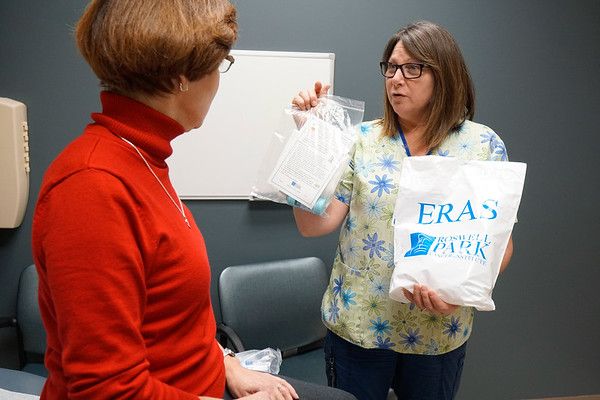Patient Education Notes
If your treatment plan includes surgery, the recovery process may seem overwhelming. You may be on a restricted diet or experience limited movement and pain after a major operation. Enhanced Recovery After Surgery (ERAS) is a program that allows for a smoother, faster recovery by changing the way you prepare for surgery and your post-op care. Following the ERAS guidelines keeps your digestive system from shutting down and prevents your body from weakening due to dehydration and immobility. This reduces the length of your hospital stay, lowers the risk of complications and improves pain control.
If you are having surgery in a clinic that uses the ERAS program, you will be given an ERAS kit by your clinicians. The kit will contain instructions, which a nurse will review with you, and juice to drink on the day of your surgery. The juice will help your bowels recover and also help you heal. Depending on the procedure you are having, the kit may also contain a special antiseptic wash (CHG) to help lower the risk of infection.
An incentive spirometer may be included. If so, your nurse will show you how to use it. The spirometer and breathing exercises help prevent pneumonia and other respiratory problems after surgery.
Never miss another Cancer Talk blog!
Sign up to receive our monthly Cancer Talk e-newsletter.
Sign up!Other ERAS Guidelines:
- Eating/Drinking: New guidelines have fewer restrictions on when and what you can eat. Usually you will be able to eat closer to the start of your surgery and have a normal diet the day after. Good nutrition and staying hydrated will allow you to heal faster.
- Pain Control: Taking oral non-opioid (non-narcotic) pain medications before surgery can provide a head start on controlling pain after surgery, enabling you to get up and move soon afterward. This may minimize or eliminate the need for opioid medications, which can slow recovery.
- Digestion: Taking stool softeners and laxatives soon after surgery will help prevent constipation.
- Activity: Getting out of bed and walking soon after surgery will help prevent pneumonia and blood clots.
Several clinics at Roswell Park are using ERAS, and more are in the process of introducing it. Not every patient is a candidate for the program (for example, those who are experiencing a bowel obstruction are not able to participate), but it is becoming more widely available as a surgical practice.
Whether you receive traditional surgery or participate in the ERAS program, you can be confident that your doctors, nurses and other members of your Roswell Park team will work to keep you comfortable and safe, reduce the risk of complications and speed your recovery.
This information is provided by Roswell Park’s Patient Education Department. Questions or comments? Please call 716-845-8784.

